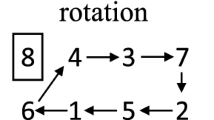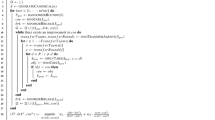Abstract
A considerable number of sports competitions cope with limited availability of teams and sports infrastructure by organizing their timetable around a season that comprises many more time slots than games per team. However, in such timetables the rest period between teams’ consecutive games can vary considerably and the difference in the number of games played at any point in the season can become large. In this paper, we propose an iterative two-phase approach to construct relaxed round-robin timetables that are less prone to these fairness issues. In particular, the first phase determines the game-off-day pattern (GOP) set which regulates when teams play (home or away) or have an off day (also called bye). Subsequently, the second phase constructs a compatible timetable which specifies the opponents and the home advantage of the games. If no compatible timetable exists, we generate one or more logic-based Benders cuts that rule out the infeasible GOP set in future iterations. We test the two-phase approach on a problem where feasibility of the timetable and the objective value is mainly determined by when teams play games and show that our approach excels when the number of additional time slots is moderate.

Similar content being viewed by others
References
Atan, T., & Çavdaroǧlu, B. (2018). Minimization of rest mismatches in round robin tournaments. Computers and Operations Research, 99, 78–89.
Bao, R. (2009). Time relaxed round robin tournament and the NBA scheduling problem. PhD thesis, Cleveland State University.
Bean, J. C., & Birge, J. R. (1980). Reducing travelling costs and player fatigue in the National Basketball Association. Interfaces, 10, 98–102.
Çavdaroǧlu, B., & Atan, T. (2020). Determining matchdays in sports league schedules to minimize rest differences. Operation Research Letters, 48, 209–216.
Costa, D. (1994). An evolutionary tabu search algorithm and the NHL scheduling problem. Infor, 33, 161–178.
Durán, G. (2020). Sports scheduling and other topics in sports analytics: A survey with special reference to Latin America. TOP, 29, 125–155.
Durán, G., Durán, S., Marenco, J., Mascialino, F., & Rey, P. A. (2019). Scheduling Argentina’s professional basketball leagues: A variation on the travelling tournament problem. European Journal of Operational Research, 275, 1126–1138.
Goossens, D., Yi, X., & Van Bulck, D. (2020). Fairness trade-offs in sports timetabling. In C. Ley & Y. Dominicy (Eds.), Science meets Sports: when statistics are more than numbers. Cambridge: Cambridge Publishing Scholars.
Hooker, J. N., & Ottosson, G. (2003). Logic-based benders decomposition. Math. Program, 96, 33–60.
Knust, S. (2010). Scheduling non-professional table-tennis leagues. European Journal of Operational Research, 200, 358–367.
Nemhauser, G. L., & Trick, M. A. (1998). Scheduling a major college basketball conference. Operations Research, 46, 1–8.
Rahmaniani, R., Crainic, T. G., Gendreau, M., & Rei, W. (2017). The benders decomposition algorithm: A literature review. European Journal of Operational Research, 259, 801–817.
Rasmussen, R. V. (2008). Scheduling a triple round robin tournament for the best Danish soccer league. European Journal of Operational Research, 185, 795–810.
Rasmussen, R. V., & Trick, M. A. (2007). A benders approach for the constrained minimum break problem. European Journal of Operational Research, 177, 198–213.
Schönberger, J., Mattfeld, D. C., & Kopfer, H. (2004). Memetic algorithm timetabling for non-commercial sport leagues. European Journal of Operational Research, 153, 102–116.
Scoppa, V. (2015). Fatigue and team performance in soccer: Evidence from the FIFA World Cup and the UEFA European Championship. Journal of Sports Economics, 16, 482–507.
Suksompong, W. (2016). Scheduling asynchronous round-robin tournaments. Operations Research Letters, 44, 96–100.
Trick, M. A. (2003). Integer and constraint programming approaches for round-robin tournament scheduling. In E. Burke & P. De Causmaecker (Eds.), Practice and Theory of Automated Timetabling IV (pp. 63–77). Berlin: Springer.
Van Bulck, D., & Goossens, D. (2020). Handling fairness issues in time-relaxed tournaments with availability constraints. Computers and Operations Research, 115, 104856.
Van Bulck, D., & Goossens, D. (2020). On the complexity of pattern feasibility problems in time-relaxed sports timetabling. Operations Research Letters, 48, 452–459.
Van Bulck, D., Goossens, D. R., & Spieksma, F. C. R. (2019). Scheduling a non-professional indoor football league: A tabu search based approach. Annals of Operations Research, 275, 715–730.
Van Bulck, D., Goossens, D., Schönberger, J., & Guajardo, M. (2020). RobinX: A three-field classification and unified data format for round-robin sports timetabling. European Journal of Operational Research, 280, 568–580.
Acknowledgements
David Van Bulck is a postdoctoral research fellow funded by the Research Foundation—Flanders (FWO) [1258021N].
Author information
Authors and Affiliations
Corresponding author
Additional information
Publisher's Note
Springer Nature remains neutral with regard to jurisdictional claims in published maps and institutional affiliations.
A preliminary version of this article appeared in the Proceedings of the 13th International Conference on the Practice and the Theory of Automated Timetabling. PATAT 2021: Volume 1, pp. 172-187.
Rights and permissions
About this article
Cite this article
Van Bulck, D., Goossens, D. Optimizing rest times and differences in games played: an iterative two-phase approach. J Sched 25, 261–271 (2022). https://doi.org/10.1007/s10951-021-00717-3
Accepted:
Published:
Issue Date:
DOI: https://doi.org/10.1007/s10951-021-00717-3




